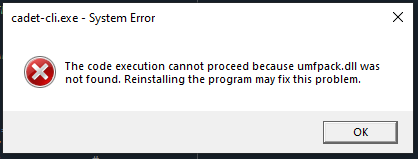Hey Franziska and welcome to the CADET-Forum! 
Can I ask, how did you install CADET, via conda? Yesterday, another user also reported issues with umfpack. We “solved” the problem by nuking and reinstalling their conda environment.
First, remove the existing environment:
mamba activate base
mamba env remove -n cadet # assuming your environment is called `cadet`
Note that I’m using mamba instead of conda. Ain’t nobody got time for resolving conda dependencies  . And
. And mamba is a much faster drop-in replacement for conda. For more information, see here.
To install mamba, run the following command in your base environment:
conda install mamba
For your new environment, I’d highly recommend creating an environment file. It makes setting up new environments much easier. For example, take the following and store it in an environment.yaml file:
name: cadet
channels:
- conda-forge
dependencies:
- python=3.10
- cadet
- pip
- pip:
- cadet-process
It defines a new environment called cadet and specifies all packages you want to install in that environment. As you can see, it’s also possible to specify pip packages. If you have other dependencies, just add them correspondingly. Moreover, you can specify the exact version of the package you want to use. This helps with reproducibility, should any of the packages have breaking changes in their API at some point.
You can store that file wherever you want. It might make sense to create one for each of your research projects but that’s up to you. Then, run the following command to create the environment (please modify the location to your environment file):
mamba env create -f <path/to/environment.yml>
By the way, for new users, we now recommend using CADET-Process. It’s a much improved user experience and provides many convenience methods for setting up models and analyzing results. It also includes a very flexible optimization suite, tailored for parameter estimation and process optimization.
Should you have any questions or if that does not solve your problem, please let us know. We can also setup a quick call.
Best regards,
jo

